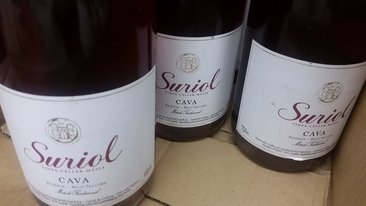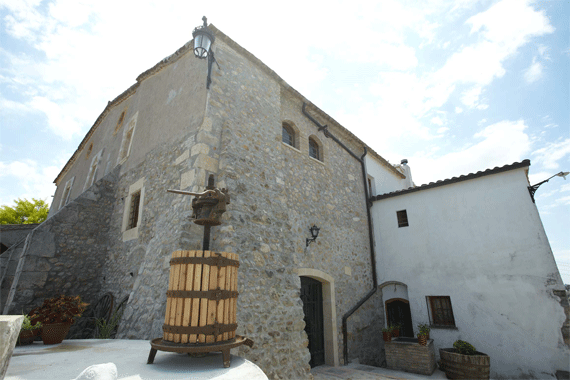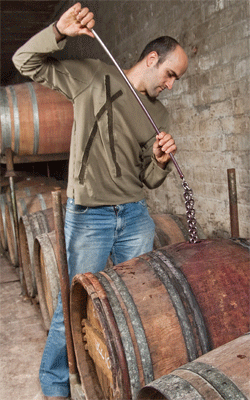
by Patrick Ogle
Cellers de Can Suriol make Cava but they make more than just Spain's sparkling wine. In addition to the three Cavas they produce still wines from xarel-lo, parellada and a local clone of tempranillo (ull de llebre).
All the wines at Suriol are produced with practices you often find in much more expensive wines--there is no dosage in the sparklers, native yeasts, organic grapes and limited sulphur. They do not cut corners.
"I am doing what is really necessary to make wines, taking care of each process but leaving the grapes and the wine develop its own potential," says Assis Suriol. "I am a farmer and the winemaker is the grape, that means that I have to take care about each process in the vineyard and drive, in a good way, the fermentations and the products in the winery to have incredible, good products."
They produce their cavas using both time honored techniques and modern science.
"I am continuing the heritage and the knowledge from my father and grandfather. Our idea is the same and always mixes ancient knowledge with a scientific approach to make incredible sparkling wines, Cava and Penedès wines," he says.
Cellers de Can Suriol make Cava but they make more than just Spain's sparkling wine. In addition to the three Cavas they produce still wines from xarel-lo, parellada and a local clone of tempranillo (ull de llebre).
All the wines at Suriol are produced with practices you often find in much more expensive wines--there is no dosage in the sparklers, native yeasts, organic grapes and limited sulphur. They do not cut corners.
"I am doing what is really necessary to make wines, taking care of each process but leaving the grapes and the wine develop its own potential," says Assis Suriol. "I am a farmer and the winemaker is the grape, that means that I have to take care about each process in the vineyard and drive, in a good way, the fermentations and the products in the winery to have incredible, good products."
They produce their cavas using both time honored techniques and modern science.
"I am continuing the heritage and the knowledge from my father and grandfather. Our idea is the same and always mixes ancient knowledge with a scientific approach to make incredible sparkling wines, Cava and Penedès wines," he says.
Suriol notes that for a long time exports of cava were mostly from big winemakers shipping wine out in big quantities to make as much money as possible. The market was less than sophisticated. He says that now, in a more mature market, it is easier for people to understand and producers can explain the details to their customers. Consumers appreciate the details, how much care goes into making wines like those produced at Suriol.
In recent years some producers have become dissatisfied with Cava and its reputation for mass producing sparkling wines. It even led one noted producer, the descendant of the man who "invented" cava, to break away and start a new D.O. Raventos i blanc are the winemakers who created Conca del Riu Anoia. You can read an interview with Pepe Raventos HERE.
"I feel that together is always better to promote our Catalan culture and incredible soil but it is Raventós' choice." says Suriol.
Suriol says that, more and more, he finds interesting farm Cavas in the market. He also sees more people being attracted to cavas as quality increases while prices stay low.
"The price of our Cava is inexpensive because we are farmers and we don’t have any marketing department. That means that it takes years to sell our products." he says.
This time, this process, is a good thing. They are growing their business organically, letting it develop at its own pace. Ultimately Suriol hopes their prices can rise as people around the world fall in love with their wines. Currently their rose and brut Cavas sell for $14 to $16. Keep in mind these are vintage wines.
In recent years some producers have become dissatisfied with Cava and its reputation for mass producing sparkling wines. It even led one noted producer, the descendant of the man who "invented" cava, to break away and start a new D.O. Raventos i blanc are the winemakers who created Conca del Riu Anoia. You can read an interview with Pepe Raventos HERE.
"I feel that together is always better to promote our Catalan culture and incredible soil but it is Raventós' choice." says Suriol.
Suriol says that, more and more, he finds interesting farm Cavas in the market. He also sees more people being attracted to cavas as quality increases while prices stay low.
"The price of our Cava is inexpensive because we are farmers and we don’t have any marketing department. That means that it takes years to sell our products." he says.
This time, this process, is a good thing. They are growing their business organically, letting it develop at its own pace. Ultimately Suriol hopes their prices can rise as people around the world fall in love with their wines. Currently their rose and brut Cavas sell for $14 to $16. Keep in mind these are vintage wines.
Suriol make more than Cava. The produce wines from xarel-lo, a grape some Americans may know. But they also make wine using another Cava grape, paralleda.
"Xarel·Lo is the main grape in Penedés because it is easy in the fields and easy in the winery, good production and high quality to make a Cava or a still wine. It is like our Chardonnay. For me it is an incredible wine in mouth feel," he says. "Parellada is a really great wine but it need more patience in the vineyard because it is very hard to produce-- low quantities with good quality. It needs altitude (more than 300 meters) and moreover, in the winery, it is difficult to work with this grape because it is very light and delicate. For me it is an incredible wine with earthy and floral notes and with a very soft and acid mouthfeel. Xarel·lo is like our king and parellada our queen."
The do several different xarel-lo wines and Suriol says they can be quite different depending on soil, weather and the people making the wine. There are simple xarel-lo wines and more complicated versions.
Penedes, a wine area South/Southwest of Barcelona, is an area known for white wines and cava but Suriol produce tempranillos called El Pelegri and Sang de Drac.
"El Pelegrí is ull de llebre that is the Catalán clone of tempranillo, like cousins! Working in organic and biodynamic helps our vines to be more and more powerful. Our wine, Sang de Drac, is a project started in 2008 and I think that is a great wine thanks to the powerful and earthiness from our vines. Also it is important the use of chestnut tree casks that permit our wine to breath and be wonderful on the nose."
Chestnut is purportedly richer in antioxidants and some phenolic compounds than oak but it is also more porous. Conclusive studies on the relative effects of each kind of wood have yet to be done. One such study can be found HERE.
The Suriol family have been working this land for hundreds of years before the USA even existed and this fact informs the wine they make.
"We are farmers from El Castell de Grabuac, we normally say the the house made the man who lives inside. That means that we live in the farmhouse and inside the vineyards which gives a full connection with the land, nature and biodiversity," he says. "For example I only have one mission for all my life: make the Castell de Grabuac house and the Can Suriol estate will be healthier than what my father gave to me, very easy but a lot of work! Moreover I only use traditional grapes, chestnut tree casks, wild yeasts, concrete tanks under the floor, because it is my way to protect the heritage of almost 200 years and more than 100 years making wine in our land."
"Xarel·Lo is the main grape in Penedés because it is easy in the fields and easy in the winery, good production and high quality to make a Cava or a still wine. It is like our Chardonnay. For me it is an incredible wine in mouth feel," he says. "Parellada is a really great wine but it need more patience in the vineyard because it is very hard to produce-- low quantities with good quality. It needs altitude (more than 300 meters) and moreover, in the winery, it is difficult to work with this grape because it is very light and delicate. For me it is an incredible wine with earthy and floral notes and with a very soft and acid mouthfeel. Xarel·lo is like our king and parellada our queen."
The do several different xarel-lo wines and Suriol says they can be quite different depending on soil, weather and the people making the wine. There are simple xarel-lo wines and more complicated versions.
Penedes, a wine area South/Southwest of Barcelona, is an area known for white wines and cava but Suriol produce tempranillos called El Pelegri and Sang de Drac.
"El Pelegrí is ull de llebre that is the Catalán clone of tempranillo, like cousins! Working in organic and biodynamic helps our vines to be more and more powerful. Our wine, Sang de Drac, is a project started in 2008 and I think that is a great wine thanks to the powerful and earthiness from our vines. Also it is important the use of chestnut tree casks that permit our wine to breath and be wonderful on the nose."
Chestnut is purportedly richer in antioxidants and some phenolic compounds than oak but it is also more porous. Conclusive studies on the relative effects of each kind of wood have yet to be done. One such study can be found HERE.
The Suriol family have been working this land for hundreds of years before the USA even existed and this fact informs the wine they make.
"We are farmers from El Castell de Grabuac, we normally say the the house made the man who lives inside. That means that we live in the farmhouse and inside the vineyards which gives a full connection with the land, nature and biodiversity," he says. "For example I only have one mission for all my life: make the Castell de Grabuac house and the Can Suriol estate will be healthier than what my father gave to me, very easy but a lot of work! Moreover I only use traditional grapes, chestnut tree casks, wild yeasts, concrete tanks under the floor, because it is my way to protect the heritage of almost 200 years and more than 100 years making wine in our land."



 RSS Feed
RSS Feed